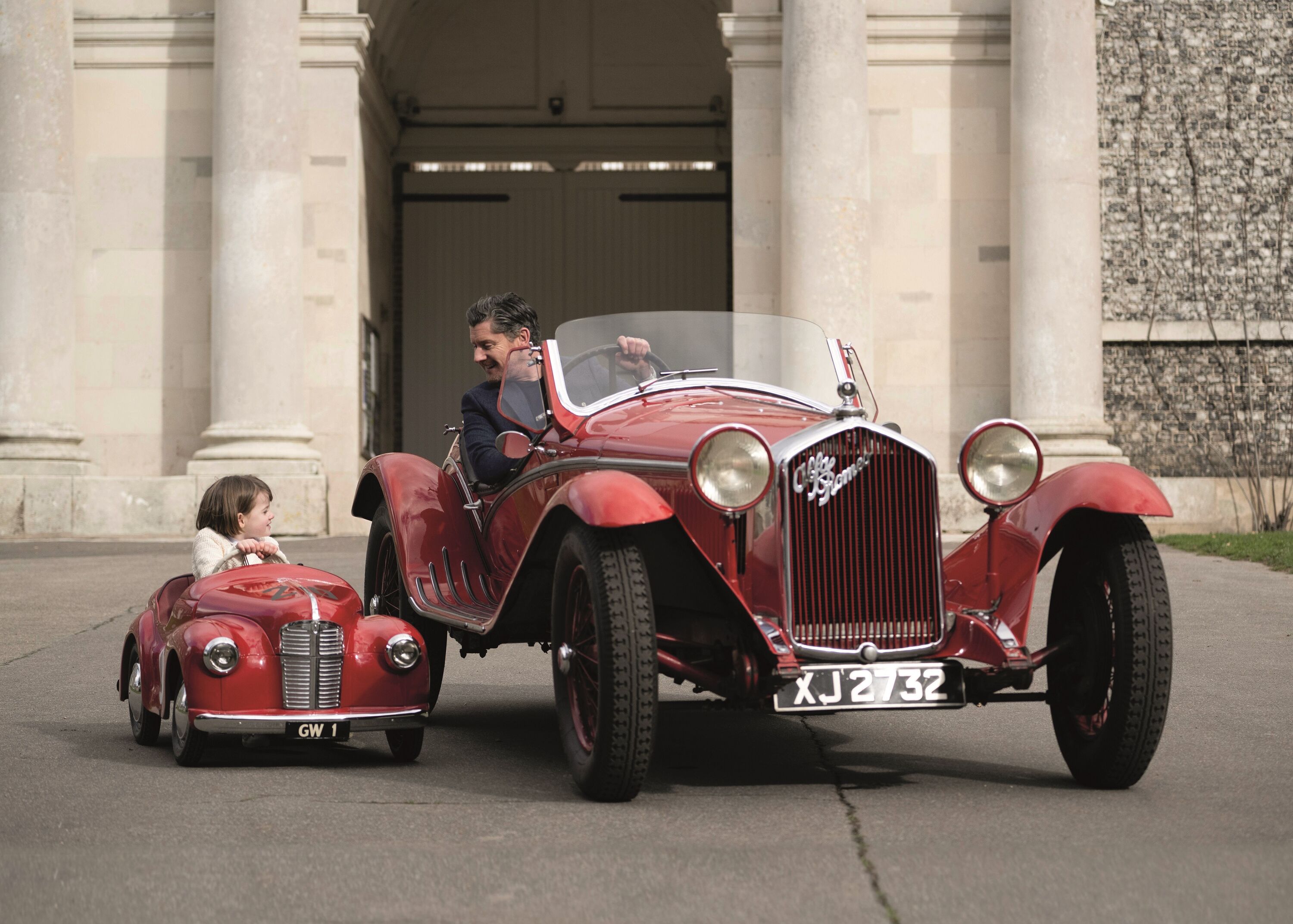INTERVIEW: Sir Tim Peake on why the next astronaut on the Moon could be a Brit
Astronaut and ambassador of FOS Future Lab presented by Randox, Sir Tim Peake, spent his time at the Festival of Speed presented by Mastercard soaring over the Moon in VR, being spun upside down in a McMurtry supercar, taking a STEM masterclass with Atlassian Williams Racing and trying his luck on the E1 powerboat simulator. Tough life.
Thankfully, we were also able to catch up with him during the event for an exclusive chat...

Are you enjoying your time here at FOS Future Lab?
I'm loving it! It's another great year for Future Lab. It just goes from strength to strength. We've got some brilliant exhibits here this year, from the deepest depths of the cosmos to the deepest depths of the ocean. Fantastic.
What has excited you most about the Festival of Speed?
Well, the Festival of Speed is remarkable because people come to have a great time, to enjoy looking at the latest technology in the motorsport environment. But at FOS Future Lab, what we do is take that and say, well, this is what else we're doing with technology and with science. We broaden people's horizons.
How did your passion for STEM lead you to become an astronaut?
Well, my passion for STEM really started, I think, a bit later in life. I did maths, physics and chemistry at A-level, but didn't really get very good results. I went on to be a military pilot. And as soon as I started working as a pilot, I realised that I needed to improve my educational skills. And so, certainly being a test pilot, I needed degree-level mathematics. I got a degree in flight dynamics. And I started loving how science can be applied in the real world to improve people's lives.

How do you think your mission to space — and all space missions — inspire young people?
Well, I think our missions in space are about three things. It is about inspiration. It's also about exploration, and it's about scientific knowledge. And the science is incredible. You know, we have probably just scratched the surface of what we can do in space. We've just realised that we can make some great pharmaceutical products that can help people back on Earth.
We can think about even maybe printing out human organs from space, like a human heart, making semiconductors in space, and solar power beams from space. So the science is incredible. And that wonder of why we are here and what's out there, and I think space can inspire people.
Do you think the technologies for space and the ocean have synergy in the future?
Yeah, there is so much synergy. I love both space and the ocean. I've been an aquanaut, I've spent 12 days living underwater in a habitat, I love diving, and I get that same sense when you go on a deep dive that you do when you're up in space. You've entered another realm, and it's quite magical. And what surprises me is that we know so little about the depths of our ocean.
We've only mapped about 27 per cent of it. There's so much more to discover. So we need to protect our ocean, we need to look after it, just like we need to protect and look after space. They both have so much to teach us.

How do you think AI and robotics can help inspire solutions?
Well, I'm excited actually about the future with AI and robotics, and I know there are many things we need to consider, and we need to also think about the risks as well, but actually, AI as a tool is a very smart way of handling massive amounts of data and recognising patterns and in things like medicine that can help us with screening for diseases.
In terms of cosmology, it can help us to assimilate the massive data that we have about stars and galaxies and make sense of it. And it's a tool that, as humans, we need to be able to use. We will never change our human intuition. We're pretty ingenious, we've got nuance, we've got empathy, we've got humour, and these kinds of things, alongside AI, mean we can get the best of both worlds.
Is there anything inside FOS Future Lab that's caught your attention?
There are loads! I go to every single exhibit and something makes me curious; it makes me catch my breath. I’ve loved flying around over the Moon's surface; that was quite magical and relaxing.
I loved speaking to Ameca, the artificial intelligence robot, and more so than the answers, because you can get the answers if you just type the question into ChatGPT, but it was more about seeing how Ameca tracked you with it eyes, it facial expressions, it frowned, it smiled, and having that kind of non-verbal communication, which humans, we pick up so much in terms of non-verbal cues that we get from other people, and to have those non-verbal cues coming from a robot, was quite remarkable.

Why is investing in future tech key to tackling global issues?
We face many global issues at the moment, not least of all decarbonising our energy system to help with the change in the climate. And so technology and science are going to help with that. It's going to help with medicine. It's going to help with a growing population. It's going to help with a lack of resources in terms of clean water, in terms of medicine, and in terms of food. I mean, we're doing all of that on the International Space Station.
We're learning how to grow food in space. If we can do it in space, we can do it in the Sahara Desert. We can beam back energy from space that can help with decarbonising the grid. We can find new medicines for patients. So all of the kinds of challenges that we face, the solutions are rooted somewhere in science and technology.
What is next for space exploration?
The next chapter of space exploration is quite exciting because you can look at different levels, like low Earth orbit, which is going to be the easiest and cheapest place to get to, where we can do large-scale manufacturing. We can have laboratories with manufacturing facilities, we can beam back solar energy from space.
And then as you go further afield, we're going to be going into our exploration program, finding more about the Moon, and are there resources out there in the solar system that can help reduce the stress on planet Earth. We’re human at the end of the day, we always want to explore, and we'll never stop, will we?

What are your thoughts on Rosemary Coogan and the possibility of her becoming the first Briton to walk on the Moon?
I'm excited about the UK's role in human spaceflight at the moment. In 2009, I was the first Brit selected by the European Space Agency, and only Helen Sharman had flown before me. Now we've got Rosemary Coogan, who has graduated from basic training with the European Space Agency as a full-time career astronaut. We've got John McFall, who is again a European Space Agency astronaut, who could be our first para-astronaut in space. We've got Meganne Christian, who is our reserve astronaut as well.
So, we're doing well in the UK now for human spaceflight, and I think for Rose, I hope she gets a long-duration mission to the space station fairly soon. That would pave the way for a potential future Artemis mission in maybe the early 2030s. So yes, Rose may be the first Brit on the moon. Fingers crossed.
What advice would you give to a young person looking to become an astronaut?
My main advice is to take a look around you at places like this and FOS Future Lab. What's exciting you? What's inspiring you? What are you passionate about? And what kind of line of work would you want to go into when you leave school, college, or university? There's no substitute for hard work, but if you enjoy what you're doing, it never seems like hard work. And certainly for the space industry, there are so many exciting careers to be had now, in science, engineering and manufacturing… or, you know, if you want to become an astronaut as well.
Randox is a global leader in diagnostics, revolutionising patient outcomes through innovative technologies, including its patented biochip technology. This pioneering diagnostic platform allows for the simultaneous detection of multiple biomarkers from a single sample, delivering faster, more accurate, and comprehensive results. Operating in over 145 countries, Randox develops advanced laboratory instruments, high-quality reagents, and innovative testing solutions to improve global healthcare.
Randox Health brings this cutting-edge technology directly to individuals, offering bespoke, preventative health testing programs. With world-class laboratories and personalised health insights, Randox Health enables early detection of a wide range of conditions, helping individuals take control of their health.
Together, Randox and Randox Health are redefining diagnostics and preventative healthcare. For more information, visit www.randox.com and www.randoxhealth.com.
Photography by Jack Beasley, Tom Shaxson, Sam Stephenson and Raife Smith.
festival of speed
fos
fos 2025
event coverage
future lab
fos future lab
interview
Tim Peake








